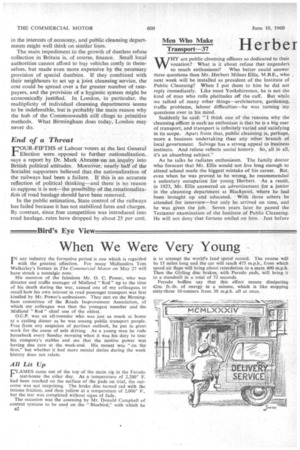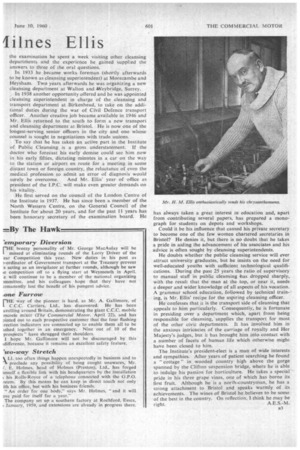When We Were Very Young
Page 36

Page 37

If you've noticed an error in this article please click here to report it so we can fix it.
I N any industry the formative period is one which is regarded with the greatest affection. For many Midlanders Torn Walkerley's feature in The Commercial Motor on May 27 will have struck a nostalgic note.
His mention of the fabulous Mr. 0. C, Power, who was director and traffic manager of Midland "Red" up to the time of his death during the war, caused one of my colleagues to recall how his own interest in road passenger transport was first kindled by Mr. Power's enthusiasm. They met on the Birmingham committee of the Roads Improvement Association, of which my colleague was then the youngest member and the Midland " Red " chief one of the oldest.
O.C.P. was an all-rounder who was just as much at home at a cycling dinner as he was among public transport people. Free from any suspicion of partisan outlook, he put in great work for the cause of safe driving. As a young man he rode horseback every Sunday morning when it was his duty to tour his company's stables and see that the motive power was having due care at the week-end. His mount was "on the firm," but whether it had more menial duties during the week history does not relate.
All Lit Up
FLAMES came out of the top of the main rig in the Ferodo test-house the other day. As a temperature of 2,2000 F. had been reached on the surface of the pads on trial, the outcome was not surprising. The brake disc turned red with the intense friction, and then yellow at a temperature of 2,000° F., but the test was completed without signs of fade.
The occasion was the assessing by Mr. Donald Campbell of control systems to he used on the "Bluebird," with which he B2
is to attempt the world's land speed record. The course will be 15 miles long and the car will reach 475 m.p.h., from which speed air flaps will bring about retardation to a mere 400 m.p.h. Then the Girling disc brakes, with Ferodo pads, Will bring it to a standstill in a total of 72 seconds.
Ferodo boffins say that this effort means dissipating 42m. ft.-lb. of energy in a minute, which is like stopping sixty-three 10-tonners from 30 m.p.h. all at once.
'emporary Diversion
rHE breezy personality of Mr. George MacAulay will be L missed at eliminating rounds of the Lorry Driver of the ear Competition this year. New duties in his post as )-ordinator of Government transport at the Treasury prevent Ls acting as an invigilator at further rounds, although he saw le competition off to a flying start at Weymouth in April. "e will continue to be a member of the national organizing )mmittee, and his colleagues hope that they have not !rmanently lost the benefit of his pungent advice.
one Furrow
HE way of the pioneer is hard. as Mr. A. Gallimore, of L C.C.C. Carriers, Ltd., has discovered. He has been avelling around Britain, demonstrating the giant C.C.C. mobile mcrete mixer (The Commercial Motor. April 22), and has ainted out to each prospective customer that the four flashing ,rection indicators are connected up to enable them all to be ashed together in an emergency. Nine out of 10 of the prospects" have shrugged their shoulders.
I hope Mr. Gallimore will not be discouraged by this 'difference, because it remains an excellent safely feature.
'wo-way Stretch
-I LL too often things happen unexpectedly in business and to preclude any possibility of being caught unawares, Mr. I. E. Holmes, head of Holmes (Preston), Ltd., has forged imself a flexible link with his headquarters by the installation t his Rolls-Royce of a telephone connected with the G.P.O. rstem. By this means he can keep in direct tonal not only ith his office, but with his business friends.
"An order for one body," says Mr. Holmes, "and it will ave paid for itself for a year."
The company set up a southern factory at Rochford, Essex, January, 1959, and extensions are already in progress there.




















































































































































